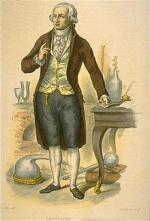Disable ads!
Antoine Lavoisier
Antoine-Laurent Lavoisier by Jules Dalou 1866 Antoine-Laurent de Lavoisier (also Antoine Lavoisier after the French Revolution; 26 August 1743 – 8 May 1794; French pronunciation: [ɑ twan lɔʁɑ də lavwazje]) was a French nobleman and chemist central to the 18th-century Chemical Revolution and a large influence on both the histories of chemistry and biology. He is widely considered in popular literature to be the "Father of Modern Chemistry." This label, however, is more a product of Lavoisier's eminent skill as a self-promoter and underplay his dependence on the instruments, experiments and ideas of other chemists. It is generally accepted that Lavoisier's great accomplishments in chemistry largely stem from the fact that he changed the science from a qualitative to a quantitative one. Lavoisier is most noted for his discovery of the role oxygen plays in combustion. He recognized and named oxygen (1778) and hydrogen (1783) and opposed the phlogiston theory. Lavoisier helped construct the metric system, wrote the first extensive list of elements, and helped to reform chemical nomenclature. He predicted the existence of silicon (1787) and was also the first to establish that sulfur was an element (1777) rather than a compound. He discovered that, although matter may change its form or shape, its mass always remains the same. Lavoisier was an administrator of the Ferme Générale and a powerful member of a number of other aristocratic councils. All of these political and economic activities enabled him to fund his scientific research. At the height of the French Revolution, he was accused by Jean-Paul Marat of selling adulterated tobacco and of other crimes, and was eventually guillotined a year after Marat's death.
 Read more on wikipedia.org Read more on wikipedia.org
 All quotes by Antoine Lavoisier All quotes by Antoine Lavoisier
 Edit Edit
|

|
|
|
|
|
Background photo by Giuliana
|